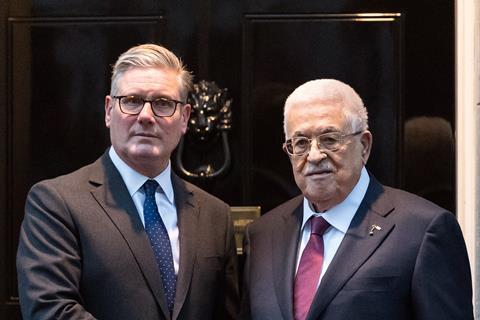The UK has joined other Western nations in formally recognising Palestine. Former Oslo Accords negotiator Dr Harry Hagopian asks whether this gesture will translate into meaningful progress toward peace, or whether it will further complicate an already volatile situation

Let me be honest with you: until the very last minute, I was unsure whether the UK, along with France and a number of other Western countries, would take the much-delayed step of recognising the statehood of Palestine.
But they did.
And of course, the analysts, journalists or observers instantly jumped in with their comments: what did this recognition mean in practice? Would it make a difference to the harrowing violence in Gaza? Would it help or impede the release of the hostages? Is there really any hope that this spate of recognitions would enhance the two-state solution? Or is this all simply pointless? After all, if recognition by 140 countries at the UN over many years hadn’t moved matters forward, what difference would another 11 countries make now?
Let’s start with the phone calls that I had with a Christian Palestinian, a Muslim Palestinian and an Jewish Israeli with whom I’d collaborated for many years when I was involved in the Oslo chapter of second-track negotiations while simultaneously running the Jerusalem Inter-Church Committee of the Middle East Council of Churches in Jerusalem.
I asked each one of them: so what do you think will change or happen now?
The Palestinian Christian reminded me that recognition is a right and not a reward. She was clear that recognition alone will not make much of a difference. A symbol of international solidarity perhaps, she added, but the Israeli prime minister will not lose any sleep over symbolisms. What is required is a focused follow-through in the form of sanctions - military or trade - that would nudge the attention of Israel. She almost yelled, “let them walk the talk!” But then, she also added resignedly, there’s the US president who covers up all of Netanyahu’s crimes.
The Palestinian Muslim hummed and hawed a bit before opening up to me. He recited a litany of grievances against Israel. He mentioned the war in Gaza, the displacement of tens of thousands of Palestinians from the refugee camps in the northern West Bank, the daily attacks upon Palestinians by illegal settlers. He drew my attention to the 520,000 illegal settlers in 141 settlements and 65 outposts in the West Bank. What are the Arab states doing, he added wryly, except holding summits and making statements?
The secular Israeli Jew was more reserved about the internal ructions within Israel. Instead, he talked about the context of recognition and reminded me that Israel is applying its massive military power to destabilise the whole region so that it alone can be the arbiter of all things Middle Eastern. He was referring to the theory of ‘creative chaos’ mentioned also by Dr Condoleeza Rice, a former US Secretary of State. By the way, he lamented with an audible shrug, the International Court of Justice and the International Criminal Court cannot dictate Netanyahu’s policies - not when there are ministers in his government who exercise so much influence upon him and also while the Jewish population of Israel is focused on releasing the hostages and hardly at all on stopping the war.
So I switched on the ‘Adagietto’ from Gustav Mahler’s Fifth Symphony that always manages to harness my grief, and mulled over their guttural reactions. Can Palestinian humanity be ignored for much longer, I wondered? And I kept coming back with three rather unsettling thoughts:
- Will recognition allow Israel to disempower the Palestinian Authority further and lead to the annexation of the West Bank?
- What about the release of the hostages that many of us also pray for: will recognition be tantamount to a reward for Hamas - a capitulation to terror as some pundits claim today?
- The Palestinian Authority has lost much of its grip, not least because Israel has starved it of the tax rebates due to it by the Paris Protocol of 2011. So can one hope that Palestinians will be allowed to decide their own future at long last? And could Palestinian hopes be revived, and Israeli concerns tamped down, once the war on Gaza ends?
I accept that recognition sounds vanishingly symbolic at this stage. It will provide a fillip to Palestinian pain, but it will not provide much hope.
Talking to many ordinary Arabs across the vast MENA and Gulf regions, I’m struck by how bitter they are about the two-faced approach when it comes to Israel and Ukraine. I’d reframe the question myself because the two cases present different geopolitical interests, but I’d still assert that self-determination of Palestine has been checkmated since 1917, when the Balfour Declaration unfurled a whole concatenation of unfortunate circumstances. So perhaps the pessoptimist in me dares hope today that the West will mend this historical aberration at long last and make recognition of Palestinian statehood the tool that would grant Palestinians real independence so they build their state next to a secure and safe Israel.




































No comments yet